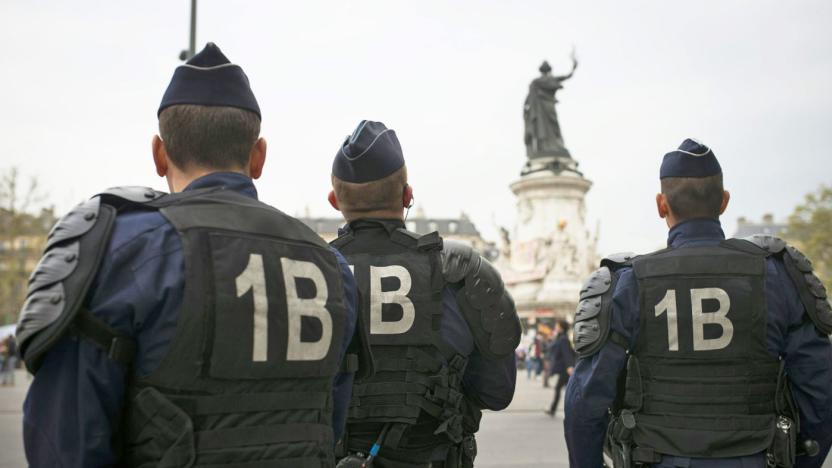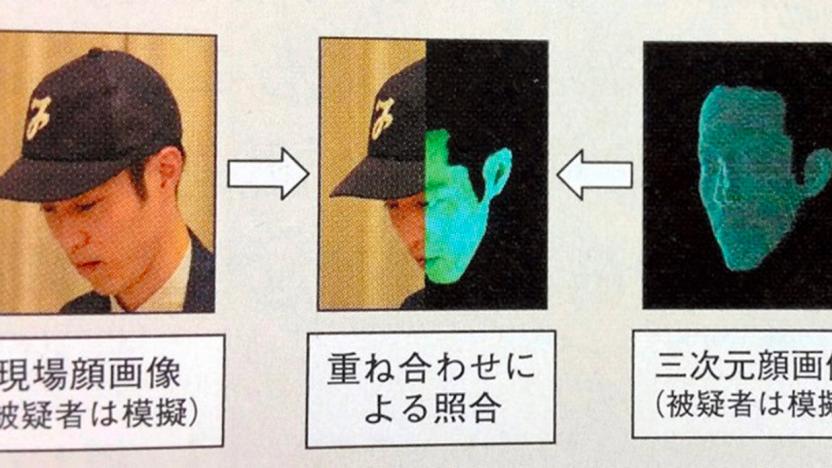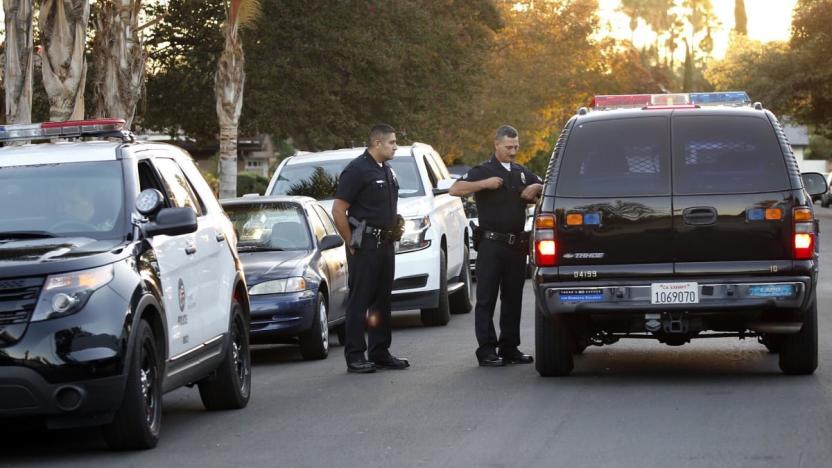police
Latest

NYPD's smartphone program is shortening crime response times
The NYPD Mobility Initiative is paying off in spades for Gotham's police. The force's Deputy Commissioner for Information Technology Jessica Tisch recently revealed that thanks to the initiative that puts smartphones and tablets in police hands, response times to crimes in progress are down 12.6 percent. Gotham's 36,000 officers are able to arrive at crimes in progress within 4 minutes and 26 seconds. According to a report by the New York Daily News, that's the lowest the responses have been in more than half a decade. That expediency extends to 911 call responses as well. With a dedicated app, the police are able to start moving toward a crime scene before a dispatcher even contacts them.

Court says police don't need warrants for phone location data
You would think that police would require a warrant to get your phone's location info, right? Not according to the US' Fourth Circuit Court of Appeals. It just ruled that asking a company for cellphone location data you've offered to a third-party doesn't represent a search under the Constitution's Fourth Amendment, and thus doesn't need a warrant. According to the judges voting for the decision, volunteering your position info means you've given up a "reasonable expectation of privacy" -- if you didn't want to share where you were, you wouldn't have handed that knowledge over to someone else, would you?

Geek Squad employee allegedly searched PCs for the FBI
An astute PC technician is supposed to report any illegal content they see while fixing a machine, but one employee of Best Buy's Geek Squad might have gone too far. The defense in a child pornography case alleges that the FBI paid Geek Squad agent Justin Meade to search customers' computers for illegal material, bypassing the warrant the FBI would need to conduct its own searches. A secret informant file supposedly shows that Meade was considered a source for child porn investigations between 2009 and 2012, leading to the bust in question. Attorneys for the accused, Dr. Mark Rettenmaier, want the evidence tossed out as a result.

Violent crime prediction algorithms are racially biased
When a criminal defendant faces sentencing in the United States, a judge can use several factors to determine a punishment that fits the crime. Increasingly, one of those factors is what is known as a "risk assessment score" -- a number meant to predict whether or not the defendant will commit another crime in the future. According to a new report from ProPublica, however, the algorithms driving those scores are biased against African Americans.

Chicago turns to big data to predict gun and gang violence
Chicago has been inundated with gun-related crimes over the past year -- nearly 3,000 people were shot in 2015, along with another 240 already in 2016. However, in a city of 2.7 million, the CPD attributes much of this violence to a small segment of the larger population: gangs. So rather than blanket a neighborhood with cops to quash the violence (which has always worked just so well), the CPD has taken a more surgical approach. They've developed an algorithm that can help predict which people are most at risk of committing or being targeted by gun violence.

Manchester police to give thousands of officers body cams
After conducting a prolonged, small-scale trial of body-worn cameras, Greater Manchester Police has announced plans to equip roughly 3,000 officers with the gizmos before the end of the year. The first new devices recently joined the 80-odd already in circulation, with more frontline officers including local Bobbies, special response units and Manchester Airport police to receive theirs over the coming months. The force expects having more cameras in the field will improve evidence gathering, as well as increasing public confidence in the officers wearing them.

Fujitsu's AI can help catch criminals on the run
When it's not being an austere provider of corporate IT services, Fujitsu likes to try its hand at a little bit of mad science. The latest project to come out of the firm's labs is an artificial intelligence that'll assign police units to specific locations during large-scale manhunts. Given that cities are large and there are never enough police around, the idea is to co-ordinate their efforts using big data and game theory. The only downside to all of this is that we might have seen the end of the bellowing police chief screaming orders at maverick cops with nothing to lose.

Paris police want drones to watch over crowds
Paris' police force is understandably anxious about crowd security as of late, and it's turning to technology in a bid to track threats hiding in those groups. It's planning to buy hexacopter drones that would be used for close crowd surveillance. The machines will have to meet very specific criteria: they'll have to clearly spot a license plate from 50m (164ft) away, fly at altitudes of 100m (328ft), require no more than 5 days of training and use encrypted connections to avoid hacks. In essence, they have to serve as an extra set of eyes that law enforcement can use without a moment's hesitation.

Tokyo police are taking 3D mugshots of suspects
Security camera footage isn't always that useful for identifying suspects, even if you know who it's likely to be. What good is a mugshot when video shows the crook's head tilted down? Tokyo's Metropolitan Police Department has an answer. As of April, all of its 102 stations will start taking 3D mugshots that let them compare faces, regardless of the angle. Ideally, this will help arrest suspects that much faster -- police won't have to guess based on plain old photos, or ask for specialized gear to be shipped across the city or country. The 2D pictures aren't going away, but officers will soon have one more tool under their belts. [Image credit: Metropolitan Police Department]

Police claim to have cracked extra-secure BlackBerry phones
BlackBerry smartphones have secure messaging as a matter of course, but for some that isn't enough: there are custom models that are even more secure thanks to PGP-encrypted mail. However, it seems that these locked down models aren't quite as safe as you'd think. The Netherlands Forensic Institute has confirmed a recent report that it's capable of scooping up encrypted data from PGP-equipped BlackBerry devices. It's not discussing the exact techniques involved, but it's relying on a tool from CelleBrite to get the job done. One possibility is that investigators are guessing the password based on a memory dump, although that normally requires yanking a memory chip off the phone's motherboard.

UK police try to scare teen hackers by visiting them at home
As you might have noticed, many teen hackers aren't easily deterred. Why would they be when they have a lot to prove, loads of peer pressure and little sense of the damage they're doing? British police think they have a way to scare those hackers straight, though. They've been visiting teens in person when the kids are near committing a crime that involves jail time, such as when they get access to a tool for denial of service attacks. Naturally, the hope is that they'll realize the police (and soon afterward, their parents) are watching and back off before they face charges.

French police want to ban public WiFi during emergencies
The FBI isn't the only law enforcement agency that wants to restrict privacy for the sake of national security. Following the Paris attacks of November 13th, French police and gendarmes have submitted a wish list of security measures for a new bill, according to a document discovered by LeMonde. Among other things, police want to ban public WiFi during states of emergency, "because of the difficulty of identifying people connected to it," according to LeMonde. French law enforcement also wants the Tor network banned completely and would force companies like Microsoft to hand the encryption keys for apps like Skype to police.

TalkTalk hack: Police make fifth arrest on blackmail charges
Now that we know the full extent of the TalkTalk hack, the whole affair has started to quieten down. Police are still pursuing the people responsible though and now, we've been told that a fifth suspect has been arrested. Officers used a search warrant on a property in Llanelli, Wales, before apprehending an 18-year-old boy on suspicion of blackmail. Unlike the other four suspects that have been arrested -- a 15-year-old from Northern Ireland, a 16-year-old from Feltham in London, a 16-year-old from Norwich and a 20-year-old man from south Staffordshire -- he hasn't been released on bail, at least not yet. At this time, he also isn't suspected of any Computer Misuse Act offences.

Belgian Twitter users post cat pics to help police in weekend raids
Belgium's capital, Brussels, entered lockdown this weekend as authorities swept the city for suspected terrorists, including at least one high-profile fugitive wanted in connection with the Paris attacks. On Twitter, authorities prompted residents to refrain from posting pictures or information about ongoing police movement -- and Belgian residents obliged, with a twist. They flooded the hashtag #BrusselsLockdown with pictures of cats, making information about raids harder to find and showcasing the country's solidarity against terrorism. On Monday, as the city remained under its highest-level terror alert, Belgian federal police thanked residents on Twitter with a picture of cat food and the message, "For the cats who helped us last night... Help yourself!"[Image credit: Flickr/julochka]

Self-balancing skateboards are illegal in New York, too
If you ride a self-balancing skateboard in New York, you won't have just the seething hatred of those around you to deal with. A tweet from NYPD's 26th precinct, since deleted, pointed out that using the tech is illegal, and both IGN and Gothamist followed up with the relevant parts of state law. Apparently, Title 19, Chapter 1, Subchapter 3, Section 19-176.2 of New York's code actively prohibits such devices from being used in the streets. The legislation says that any "motorized scooter" that propels people with power, but can't be registered with the DMV, can't be taken out and about. If an official spots you, then you could face a fine of up to $500, although we'd politely suggest that they've got bigger fish to fry than an obnoxious Vine kid playing with their birthday present. [Image Credit: Christopher Furlong/Getty Images]

Google's cars have driven 1.2 million miles without getting a ticket
This afternoon Aleksandr Milewski posted a picture that suggested the ticket-less streak might come to an end, but now Google says its car was flagged down because it was going so slowly. These new prototype models are classified as "Neighborhood Electric Vehicles" and have their speeds capped at 25mph, so they stick to slower-moving streets. The officer had some questions about the car, which is apparently common for the cartoony vehicles. According to Google, its self-driving vehicles have driven 1.2 million miles, or the equivalent of 90 years of experience for an average person -- and probably still can't get an insurance discount.

California police use these biometric scanners
Police are increasingly turning to biometric tech in the field. It's supposed to help cops verify the identity of suspects, but there's a real concern that they could abuse this to get personal details on record -- and the Electronic Frontier Foundation wants you to know when this hardware might come into play. The rights group has published a report detailing the biometric scanners in use by California law enforcement, and they're in more widespread use than you might think. Mobile fingerprint readers are in use at several departments, and face recognition is getting traction. The Los Angeles County Sheriff's Department is using tattoo recognition, and some police departments are looking into iris scanning.

Anonymous says it's outing 1,000 prominent KKK members (updated)
Anonymous is no stranger to risky internet activism, and its latest campaign is no exception to the rule. The hacking-focused collective claims that it's outing "up to" 1,000 people who are either Ku Klux Klan members or "close associates" of KKK factions. It says it'll reveal all on November 5th, but an early data leak already purports to name-and-shame mayors, members of Congress and police officers (including cops in Ferguson, Missouri). If true, the details would potentially wreck more than a few careers -- especially those of people who use roundabout methods to support the Klan while keeping their racist connections a secret.

DJI drones to help Devon, Cornwall and Dorset police fight crime
Drones have been used for all sorts of devious deeds, but now they're being used to save lives too. Police in two English counties, Devon and Cornwall, have recruited a pair of DJI Inspire 1 drones to help with crime scene photography and missing people searches. The two new quadcopters are based in Exeter and Plymouth, and so far three officers have obtained the CAA qualification necessary to fly them. Police in Dorset are now preparing for a similar trial, and hope to have access to their own drone from November 26th.

TalkTalk hack investigation results in a third arrest
Just how many people were involved in the TalkTalk hack? That's the question everyone's now asking after UK police arrested a third individual over the weekend. Detectives from the Metropolitan Police Cyber Crime Unit apprehended a 20-year-old man on Saturday, after obtaining a search warrant for a property in south Staffordshire. He was later released on bail, and officers have confirmed that he won't be recalled until March next year. Police arrested a further two suspects last week -- a 15-year-old boy from County Antrim, Northern Ireland, and a 16-year-old boy from Feltham, London. An address in Liverpool has also been examined, although it's unclear how that relates to the overall investigation.








